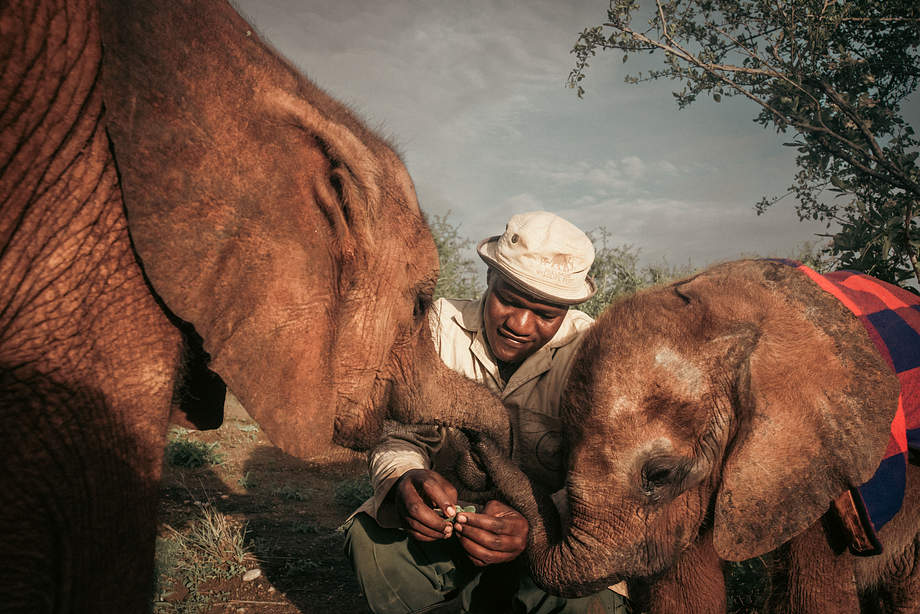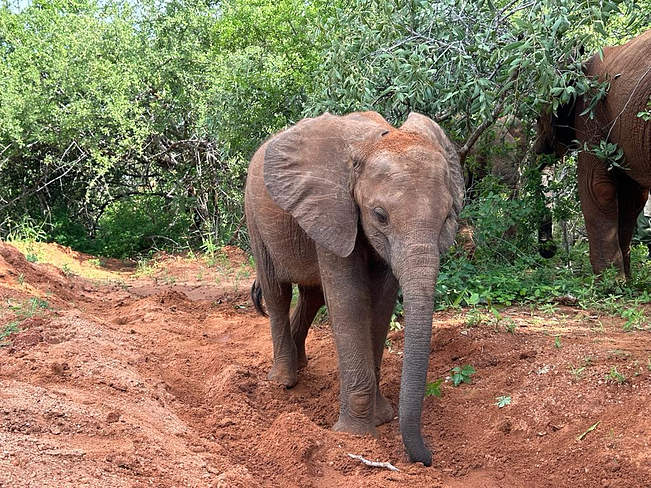In Kaluku, rains dominated the month of November. Almost overnight, the parched landscape transformed into a veritable jungle. This metamorphosis happens every rainy season, but each time we witness it, we can’t quite believe our eyes.
With the rains comes a deluge of dudus [insects]. They materialise seemingly out of nowhere, dominate the airspace for a spell, and then evaporate as quickly as they appeared. For Spencer the orphaned bushbaby, their arrival elicited a mixed reaction: As a creature whose diet largely consists of insects, he was suddenly surrounded by a veritable evening feast.
However, some of the dudus must seem alarmingly large to a tiny bushbaby. One memorable evening, Spencer stalked a giant grasshopper for the better part of an hour, trying to decide whether he was more fascinated or frightened by it. Turning his round head in a near-360-degree circle, he inspected every inch of the insect, getting very close but never actually touching it. In the end, Spencer’s fear won out, and the creatures went their separate ways.
The orphaned elephants:
No one was more excited about the rains than the orphaned elephants. They embarked on each increasingly green day with an air of wonderment, eager to explore the oasis that Tsavo had become. One particularly rainy afternoon, they even eschewed the mud bath and headed back to browse in the bush immediately after finishing their bottles. This shows good instincts: In the wild, browsing is a serious business, and elephants must take full advantage during times of plenty.
Of course, it’s not all business: One afternoon, the orphans were very reluctant to leave the mud bath. They were captivated by a large fallen tree — one they’ve passed countless times before, but on this particular day, it really captured their attention. Everyone scratched and sashayed against the rough bark, until the Keepers finally coaxed them into the bush.
The rains also turned the little dust bath by the stockades into a proper mud bath. This became the new morning meeting place. Immediately after exiting their bedrooms, the orphans converged for an early splash. Interestingly, Rokka, who is a water baby of note, rarely participated in these morning sessions. Perhaps she prefers to save her swimming for when the sun is high in the sky.
The boys are another story. Manda, Vaarti, and Mayan always put on their best show, squeezing their big bodies into the small pond. Mwinzi and Natibu prudently stay out of their way, instead having a mini wallow on the water’s edge. The Keepers laughed one day, as all the bulls were in their own little worlds — and having such a splendid time of it. Vaarti and Mayan were so engaged in their sparring match that they nearly sat on Mwinzi and Natibu, who were having their own tussle directly behind them. Far from being deterred by the near-squash, the younger bulls just scooted a few inches away and resumed their game.
At Kaluku, everyone has their set milk routine. Vaarti always arrives first for his bottle, and Mayan always brings up the rear. Manda’s modus operandi seems to be to disrupt the routine as much as possible. One day, he was dead set on stealing empty bottles from the wheelbarrow, but the Keepers expertly thwarted his every attempt. As it was being wheeled away, he snatched a teat from one of the bottles and ran off with it triumphantly held aloft in his trunk — a small victory, but a victory worth celebrating nonetheless!
As we mentioned in last month’s update, Natibu came to us very traumatised from the ordeal that left him orphaned. He was found trapped inside a manhole, with only the top of his head visible. For a long time, he found his stable to be claustrophobic — but how things have changed! Now, he sleeps soundly and peacefully through the night. His cheerful face is the first to greet us each morning, eyes shining brightly as he waves his trunk over his stable door to say hello.
Mwinzi is growing bigger, stronger, and — if possible — even rounder with each passing day. When he stretches up to browse, we can spot two telltale signs that our little bull is growing up: tiny tusks, just starting to emerge! He is just as cool, calm, and collected as ever.
At the end of October, Rokka initiated some room rearrangements at our Kaluku Neonate Nursery. She had become restless in her original stockade, pacing around at bedtime and acting agitated. We wondered if she would prefer a room in a quieter corner of the compound, so we did an experiment, swapping Rokka and Mayan’s bedrooms.
One month in, and we can safely say that we made the right move. Mayan enjoys being in a centrally located bedroom, where he can keep an eye on Twiggy the giraffe, his big elephant friends, and the little elephants’ stable blocks all at once. Meanwhile, Rokka is much more rested in her quieter corner of the stockade compound.
Chamboi the orphaned rhino:
This month marked the debut of Chamboi, the latest addition to our Kaluku herd. This enchanting, button-nosed black rhino was rescued when he was just a day old. His story began on the afternoon of 6th September 2023, KWS and Tsavo Trust rangers spotted a lone, newborn rhino calf by a waterhole. He was located in the free release rhino range of Tsavo West National Park, which is home to a healthy population of black rhinos. However, his mother was nowhere to be found.
Because Chamboi is a rhino of Tsavo, we brought him to our Kaluku Neonate Nursery, located in the ecosystem. He embraced Kaluku life from the outset — which is hardly surprising, given we are essentially the only family he has ever known. Within a few weeks of his rescue, he had blossomed into a real character, full of bluster and bravado.
As is typical of his kind, Chamboi follows his own beat. It is wise to create a healthy distance between orphaned elephants and rhinos, as over-familiarity in the wild can have lethal consequences. Rhinos are a solitary species, and Chamboi is quite content to do his own thing, provided that a beloved Keeper is always by his side. Clad in his cherry red blanket, he has become a favourite among everyone at Kaluku.
Apollo the orphaned rhino:
It has now been two months since Apollo graduated to Rhino Base, his own personal reintegration unit in Tsavo East National Park. October was a month of transition, as he acclimated to his new home from the security of his open-air, double-sided stockade compound. Rhinos are very particular and adverse to change, so we didn’t want to overwhelm him with too much ‘newness’ all at once.
By the end of October, Apollo was sufficiently acclimated to his new terrain. At last, we felt it was time to introduce him to the 50-acre wandering grounds that abut his stockade compound. The team had been hard at work making it rhino ready, creating a network of Apollo’s dung piles so he would recognise it as his new territory. [As we have said before, Apollo will ultimately venture beyond the fenced boundaries and into the wilds of Tsavo, but things happen very gradually with rhinos.]
We approached his first day out with equal measures of excitement and apprehension. Apollo is a big rhino now, and any unknown comes with some element of stress. At 6:30 AM, everyone stood in position. Justus, one of Apollo’s original Keepers, opened his stockade gate and called his name. Apollo duly lumbered out and followed his Keeper’s lead. He was curious, but not overwhelmed or uneasy. This is a testament to the strong bond he has with Justus, whom he trusts implicitly.
From there, everything unfolded without a hitch. Apollo has been thoroughly enjoying exploring his new patch of wilderness — all the more so once the rains arrived, turning it into a leafy jungle. He spends his days munching contentedly, stopping for midday siestas in the shade and indulging in his favourite mud baths. We can say wholeheartedly that this new chapter suits Apollo very well.
Apollo is now living at Rhino Base, Tsavo East National Park
Twiggy the orphaned giraffe:
As adults, giraffes eat more than 30 kilograms of food in a single day. They aren’t very efficient eaters — they only consume a few leaves with every bite, after all — which is why they must spend lots of time at the activitiy. During the dry season, they dedicate most waking hours to finding ample sustenance.
The past few months have been taxing for Twiggy, as the dry season evaporated most of the browse in Tsavo. Of course, we kept her satisfied with supplemental feedings, but her priorities are well-placed — this drive to find food will serve her well when she is leading a fully wild life.
All the same, Twiggy welcomed the rains with great enthusiasm. They marked a turning point in her daily schedule; no longer did she have to focus so wholeheartedly on the hunt for food. We noticed that she suddenly adopted a much more leisurely air, knowing that she was surrounded by an endless bounty of vegetation.
Twiggy still remains the ‘queen bee’ of the smaller orphans, notably Nini, Lana, and Daza the gazelles, and Harvey and Ivan the duikers. As we noted last month, Peter — the Keeper who looks after the small orphans — relies on Twiggy as a nanny, assistant, and signpost. Whenever he needs to locate the little ones, he just seeks out the giraffe. More often than not, the little ones are loitering at her feet!










































